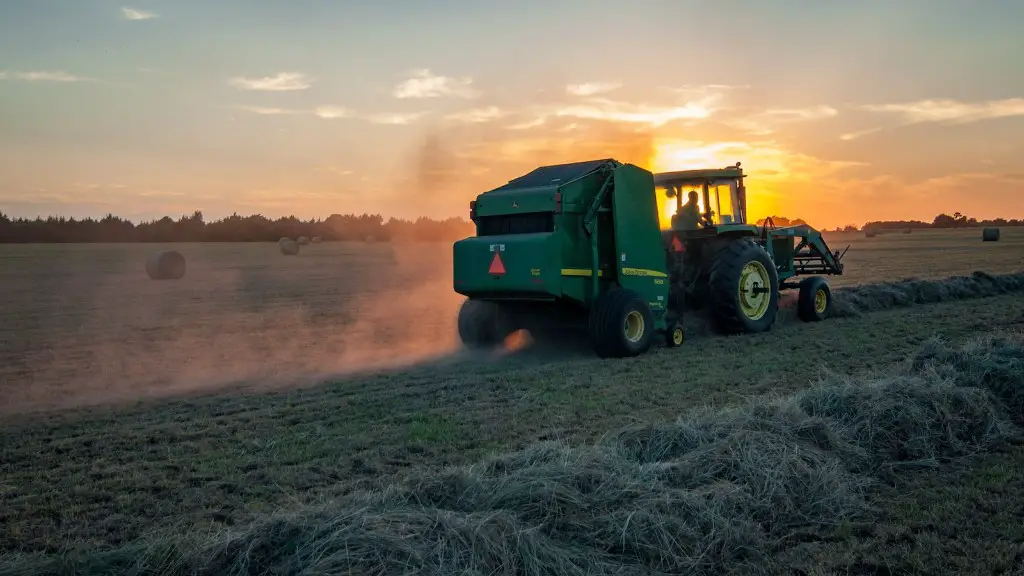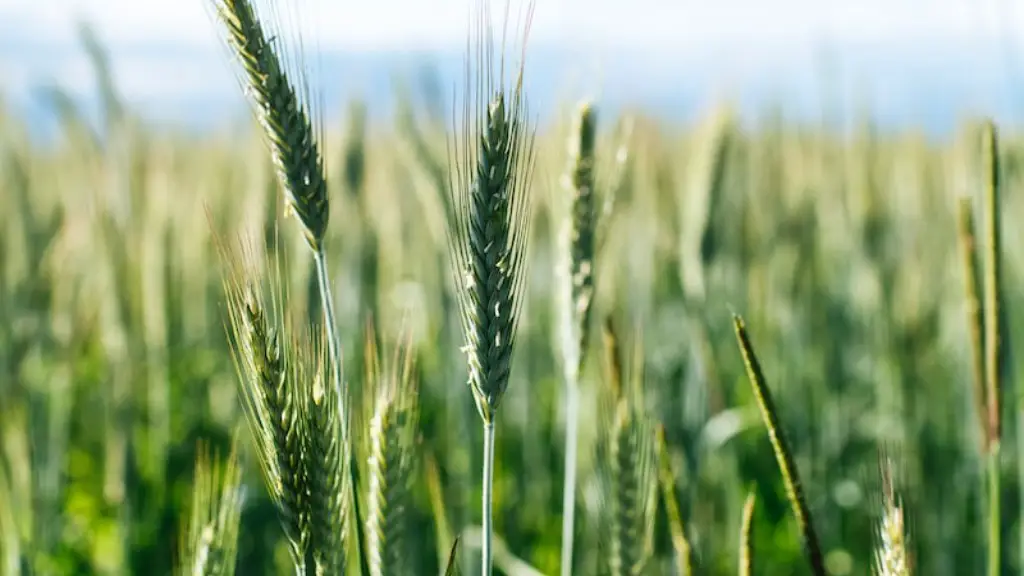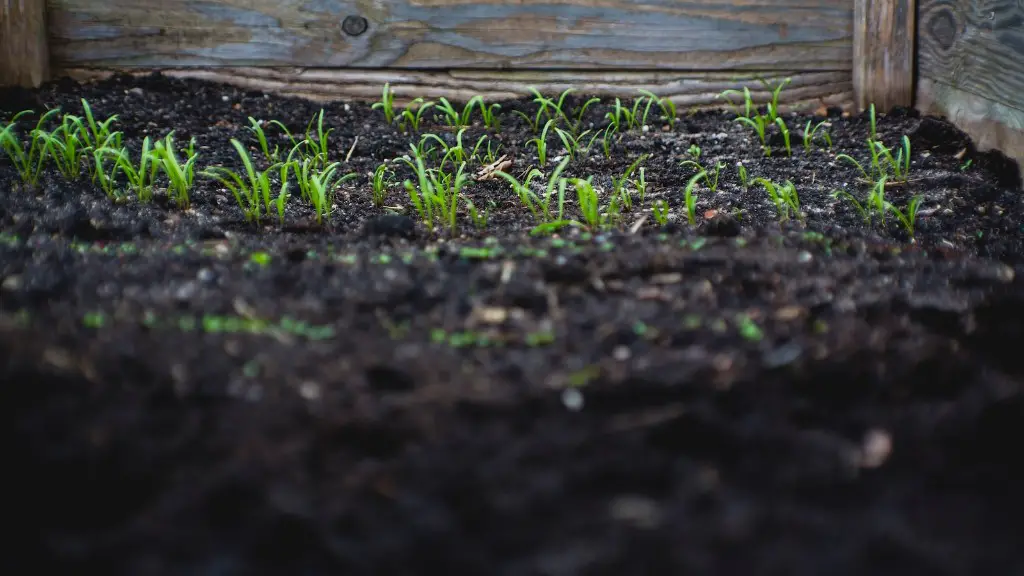Archaeologists believe agriculture began around 12,000 years ago, during what archaeologists refer to as the “Neolithic revolution.” During this time, hunter-gatherer societies that had been living in the same areas for generations suddenly began to domesticate plants, animals, and develop other technologies. This led to a shift from a nomadic lifestyle to a sedentary one and the first signs of what we recognize today as cities, towns, and other permanent settlements.
The earliest evidence of agriculture dates back to 10,000 BCE in the Middle East, specifically the fertile crescent of modern-day Iraq and Iran, in a region known as the ‘Fertile Crescent’. Here, wheat and barley were first cultivated. Evidence of grinding stones indicate that people were consuming cereals, though it is likely that other plants were also eaten.
By 8500 BCE, farming had spread to the Mediterranean region and much farther east, and evidence suggests that by 7000 BCE, farmers were growing cereals in the Indus Valley of modern-day Pakistan. By 6000 BCE, farming had spread to the Yangtze Valley in China and by 5000 BCE it had reached the Americas and Africa.
This transition from nomadic to sedentary life is often referred to as the Neolithic Revolution, and it provided the foundation for modern human civilizations. This period was the start of a major shift in the way humans interacted with their environment and food sources, and it was during this era that people began to move away from relying on hunting and gathering alone.
The practice of agriculture brought with it new innovations in technology, including better tools and methods of cultivating plants. The practice of animal domestication was also a major factor in advancing human civilization, as domestic animals provided a new source of food and a powerful tool in labor.
Agriculture has played a major role in the development of society, cultures, and economies around the world. It has allowed us to feed larger populations, which in turn has led to population growth and the development of cities and civilizations. It has also enabled us to explore the world, make advances in technology, and create the globalized world we live in today.
Impacts of Agriculture
Agriculture also allowed humans to produce surpluses of food, leading to advances in trade and commerce. This led to the development of different currencies and economies, which allowed civilizations to become wealthier and more powerful. This in turn led to the development of social hierarchies, with rulers and leaders at the top, and the rise of organized religions.
Agriculture has also had a major environmental impact. In many regions, it has replaced or degraded important natural ecosystems, leading to the loss of biodiversity, soil erosion, and reduced water quality. Today, there are many challenges facing agricultural systems, including a decline in food security, the development of monoculture crops, and the use of pesticides and fertilizers.
Agricultural technologies have also had to evolve to meet the demands of modern society. For example, genetic modification has been used to create crops that are resistant to drought and pests, and technology such as drones and satellite imagery have revolutionized crop management.
Organic Agriculture
Organic agriculture is an alternative to traditional industrial farming practices. It relies on techniques such as crop rotation, composting, and the use of natural pest and weed control methods, and it seeks to produce food in a way that is respectful of the environment and sustainable in the long term.
Organic farmers also rely on biological processes to increase fertility and soil health, rather than relying on chemical fertilizers and pesticides. This approach is believed to be better for the health of consumers and the environment, and it seeks to restore balance and protect biodiversity.
Organic agriculture is becoming increasingly popular in the West and many countries are now introducing government support programs to encourage its growth. However, much of the world’s population still relies on traditional industrial agriculture and the challenges of sustainability, environmental impact, and food security remain relevant.
Future of Agriculture
As the world’s population continues to grow and resources become increasingly limited, agriculture will have to change and adapt to the demands of future generations. In response, scientists and agricultural researchers are already developing new technologies and practices in order to meet these challenges, such as genetic modification, sustainable farming systems and urban gardening.
These and other methods are being used to increase efficiency and produce food more efficiently, while also protecting the environment and promoting biodiversity. In the future, the combination of these technologies and practices could provide the key to successful and sustainable food production.
Agribusiness
Agribusiness is an economic sector that comprises companies that build products and provide services related to the production and distribution of food and other agricultural products. This can include things such as seed companies, grain-processing companies, fertilizer and pesticide producers, food storage companies, and agricultural machinery manufacturers.
Agribusiness plays a key role in the global economy, contributing to the GDP of many countries and providing jobs for millions of people around the world. It has often been associated with large industrial farms that employ labor-saving techniques and advanced technologies, but in recent years there has been an increasing focus on small-scale and organic agriculture.
Agribusiness is also becoming increasingly intertwined with technology, as agricultural companies invest in technologies such as data science, robotics and artificial intelligence in order to become more efficient, profitable, and sustainable.
Agricultural Technology
Agricultural technology encompasses the use of technologies to improve agricultural production and efficiency. This can include the use of GPS to monitor and manage fields, the use of automated vehicles to reduce labor costs, and the use of sensors and drones to monitor crop health and conditions.
The agriculture industry is rapidly evolving with the increasing availability of new technologies and the development of advanced technology-based systems. These systems are being used to improve farming efficiency and productivity, reduce water usage, and decrease the use of pesticides and fertilizers.
Agricultural technology is also being used to develop new products, such as precision seeders that plant seeds with accuracy and minimal losses, and the use of robots to automate harvesting. These new technologies are helping to make farming more efficient and cost-effective, while ensuring that crops are harvested at the optimum moment.
Agricultural technology is also being used to improve food safety and traceability, by using sensor technology and data analysis to monitor crop health and environmental conditions. This is helping to prevent food contamination, reduce food waste, and ensure that food is supplied safely and sustainably.





